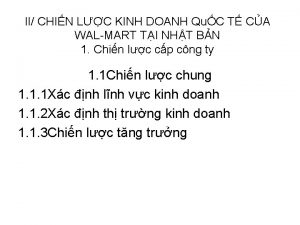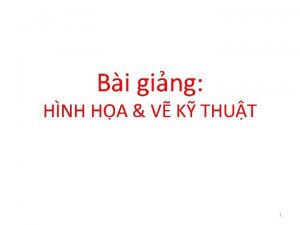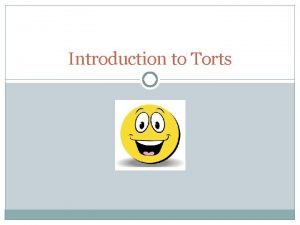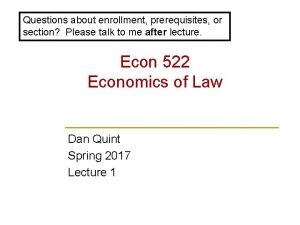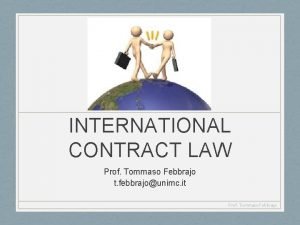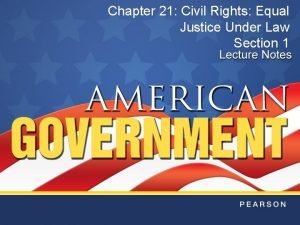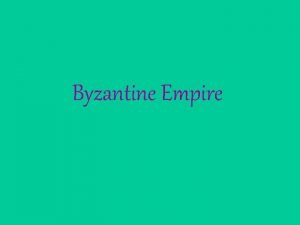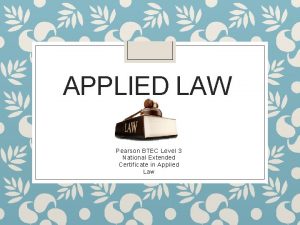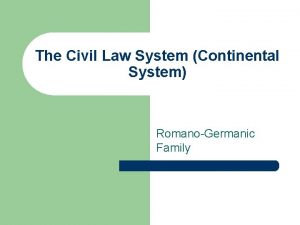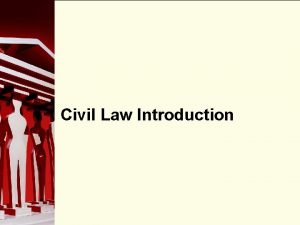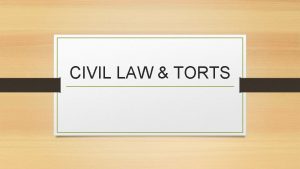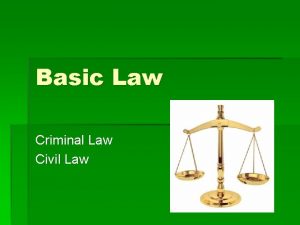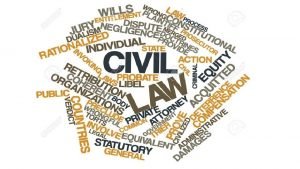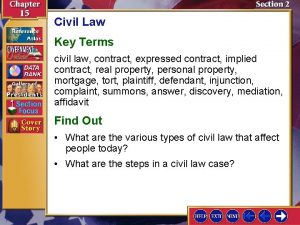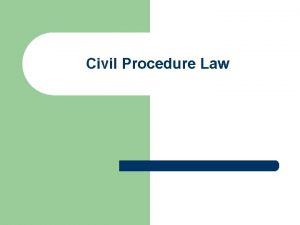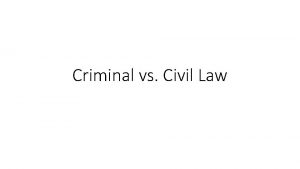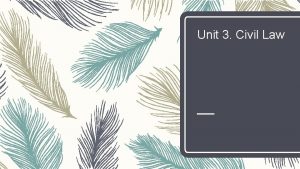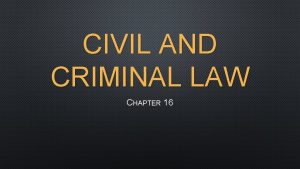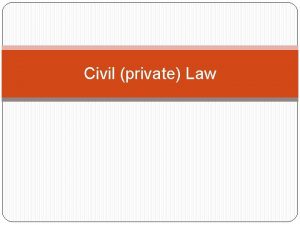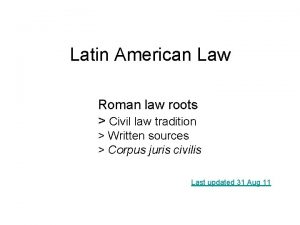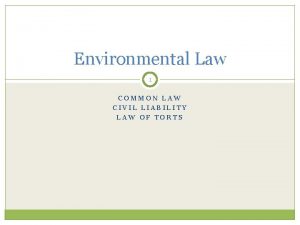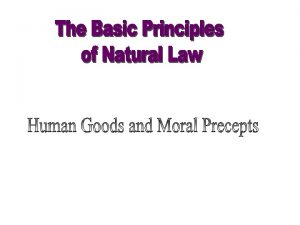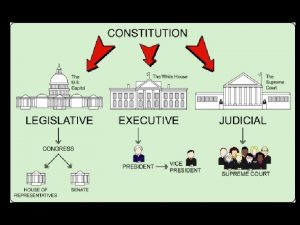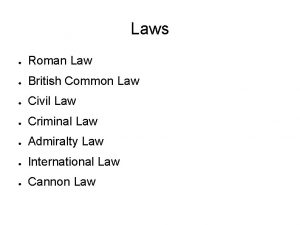Civil LawPrivate Law 12 CIVIL LAW law that





















- Slides: 21

Civil Law/Private Law 12

CIVIL LAW – law that governs the relationship between individuals Civil law deals largely with private rights and obligations. These include: n Contractual rights n Property rights n Torts (civil wrongs)

Parties are called litigants (Litigation is the action) Plaintiff- party that initiated the legal action Defendant-litigant against whom the action is taken ie: Mc. Fadden v. Harris Onus is on the plaintiff to prove the case on a “balance of probabilities”-the weighing of evidence to decide whether it is the plaintiff’s or the defendant’s version of the events that is more convincing.

Did you know that… n Persons under the age of majority cannot sue or be sued in their own name. A minor who wishes to sue must be represented by an adult, known as a next friend. If an infant or a person “under a disability” is sued, the court will appoint a guardian or adult to act as the minor’s representative. This person is also known as a “guardian ad litem”.

The proper court: Remember: In BC… n As of June 1, 2017, the Civil Resolution Tribunal began resolving most small claims up to $5, 000. The monetary jurisdiction for small claims cases in Provincial Court has been increased to $35, 000 and simplified trials at Richmond and Robson Square now include cases up to $10, 000.


n Class action suit – a lawsuit initiated by a group of people over a complaint common to all. n Ford Pinto? ? ? Not really… n Grimshaw v. Ford Motor Company 1981 n Gray died 13 year old Richard Grimshaw was seriously burned

Grimshaw and Gray’s family filed a tort action against Ford, and the jury awarded not only $2. 516 million to the Grimshaws and $559, 680 to the Grays in damages for their injuries, but also $125 million to punish Ford for its conduct. Ford engineers considered numerous solutions to the fuel tank problem, including lining the fuel tank with a nylon bladder at a cost of $5. 25 to $8. 00 per vehicle, adding structural protection in the rear of the car at a cost of $4. 20 per vehicle, and placing a plastic baffle between the fuel tank and the differential housing at a cost of $1. 00 per vehicle. None of these protective devices was used. n Ford’s cost-benefit analysis showed it was cheaper to endure lawsuits and settlements than to remedy the Pinto design. n

KINDS OF CLAIMS n n n n Damages are monetary awards. In a legal sense, “damages” refers to monetary compensation that is claimed by a person or awarded by a court in a civil action to a person who has been injured or suffered loss because of the wrongful conduct of another party. GENERAL DAMAGES SPECIAL DAMAGES PUNITIVE DAMAGES NOMINAL SPECIFIC PERFORMANCE INJUNCTIONS

GENERAL DAMAGES I Pecuniary – monetary compensation for losses that can be calculated based on how much money the plaintiff lost (loss of income, future earnings, and cost of specialized future care) n Example: car accident victim that confines the victim to a wheelchair for life. You can sue for damages to replace the car and also loss of future earnings. n Q: How would age play a factor in complicating this matter? n

GENERAL DAMAGES n n n II Non-pecuniary – terrible personal loss which does not involve an actual loss of money and is difficult to quantify, aggravated damages (humiliation or distress) (much harder to calculate) Example: pain and suffering, loss of a loved one, mental anguish, loss of enjoyment of life CAN A PRICE BE PUT ON THESE? Judges will usually make the monetary compensation based on rule of precedent.

GENERAL DAMAGES n In Andrews v. Grand & Toy Alberta Ltd. , a case decided in 1978, the Supreme Court of Canada put the ceiling of general damages at $100, 000. n Counting the inflation rate in Canada, the allowable limit of general damages (Non pecuniary) now stands at approximately $366, 000.

AGGRAVATED DAMAGES Non-Pecuniary • This type of damages is awarded for mental distress and humiliation, or pain and suffering.

SPECIAL DAMAGES -compensation for out of pocket expenses n Example: medication, therapy, ambulance services, medical expenses, lost income (fixed period of time), car repairs

PUNITIVE DAMAGES n Punish the defendant for reprehensible /malicious conduct n The court’s aim is not to compensate the plaintiff, but rather to punish the defendant n Example: false imprisonment or arrest, assault, battery, libel and slander n Take note…if the defendant has already been to criminal court and faced punishment, punitive damages in the civil case may be limited (or not allowed at all).

NOMINAL n -minimal compensation to acknowledge a moral victory n Example: someone was using your land you wanted them to stay off, you may be awarded $1 for you suffered no loss but merely wanted to assert your rights

SPECIFIC PERFORMANCE n -court order compelling someone to fulfill the terms of a contract n Example: buy a puppy from a breeder but the breeder changes her mind and gives your deposit back. You don’t want the deposit, you want the puppy!

INJUNCTIONS na court order requiring someone to do or not do something n Mandatory injunction – to do n Prohibitory injunction – forbid to do *These may be permanent or temporary Example: apply dangerous chemicals, copyright trademarks, force striking workers to return to work

ENFORCING A JUDGEMENT n You are on your own. The court doesn’t cut a cheque. n But…. if the defendant doesn’t pay you can take the following steps:

ENFORCING A JUDGEMENT Examination of a Judgment Debtor – being questioned under oath to find out about the debtor’s assets Garnishment – courts can order a % of wages, bank accounts be deducted to pay to plaintiff Execution or Seizure – sheriff seizes assets of debtor and sells them

Alternative Sources of Compensation I Motor Vehicle Liability Insurance – money from the insurer of the defendant’s vehicle (only in motor vehicle accidents) Problem: not everyone has liability insurance n II No Fault Insurance – provides immediate funds without evidence of fault n III Worker’s Compensation – provincial Workers Compensation Fund n IV Criminal Injuries Compensation – criminal injuries compensation boards have been created to compensate innocent victims when the assailant doesn’t have any assets or insurance. n
 Ngoại tâm thu thất chùm đôi
Ngoại tâm thu thất chùm đôi Block xoang nhĩ độ 2 type 1
Block xoang nhĩ độ 2 type 1 Thể thơ truyền thống
Thể thơ truyền thống Thơ thất ngôn tứ tuyệt đường luật
Thơ thất ngôn tứ tuyệt đường luật Chiến lược kinh doanh quốc tế của walmart
Chiến lược kinh doanh quốc tế của walmart Tìm vết của mặt phẳng
Tìm vết của mặt phẳng Hãy nói thật ít để làm được nhiều
Hãy nói thật ít để làm được nhiều Tôn thất thuyết là ai
Tôn thất thuyết là ai Gây tê cơ vuông thắt lưng
Gây tê cơ vuông thắt lưng Sau thất bại ở hồ điển triệt
Sau thất bại ở hồ điển triệt Civil rights and civil liberties webquest
Civil rights and civil liberties webquest What is a civil law
What is a civil law Difference between civil law and criminal law
Difference between civil law and criminal law Common law and civil law
Common law and civil law Common law and civil law
Common law and civil law International contracts
International contracts Chapter 21 civil rights equal justice under law
Chapter 21 civil rights equal justice under law Body of civil law
Body of civil law Btec applied law
Btec applied law Florida civil law notary
Florida civil law notary Sources of civil law
Sources of civil law Continental civil law
Continental civil law




